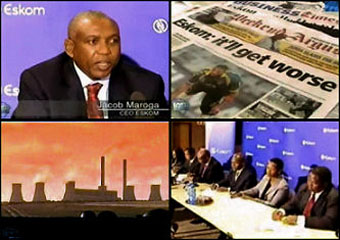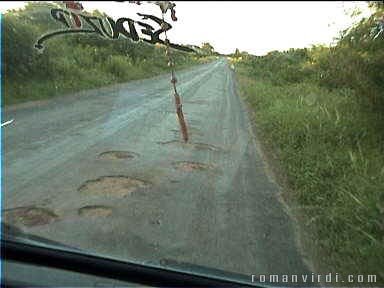White staff want to leave Eskom
CAPE TOWN – In a damning report on Eskom’s skills situation, trade union Solidarity on Thursday revealed that 75% of Eskom’s 5,000 white staff are considering quitting the company.
In an attempt to stop the skills rot, Solidarity called for a moratorium on affirmative action for five years at the state power utility.
Solidarity’s deputy general secretary Dirk Hermann said Eskom can impose the affirmative action moratorium without abandoning its commitment to transformation.
He said Eskom already achieved in March 2006 the 2014 black economic empowerment targets of 64% black managerial representation.
In addition, Eskom is close to reaching its own 64% black managerial representation target by 2010.
 Findings from his Phd in the alienation of the non-designated group, Hermann found that:
Findings from his Phd in the alienation of the non-designated group, Hermann found that:
Workers show understanding for affirmative action, but 80% feel that it is not being implemented correctly.
93% feel that promotion through hard work is out of the question.
73% feel that affirmative action prevent them from achieving their personal goals.
99% feel that they cannot influence Eskom’s affirmative action policy.
95% feel that promotion is not based on merit.
93% feel that promotion is determined by affirmative action.
77% feel that there is no future for them in Eskom.
74% do not feel that they are part of Eskom.
85% feel that they do not form part of Eskom’s future plans.
75% feel that they cannot determine their own career path.
75% are thinking of leaving the company.
64% feel that their relationship with black colleagues has deteriorated.
 
Article Source: Fin24.com
 Crumbling roads a headache for Eskom Power utility Eskom, struggling to fix a severe electricity crisis, faces another headache in trucking urgently needed coal to its generating stations on crumbling and heavily used roads.
Crumbling roads a headache for Eskom Power utility Eskom, struggling to fix a severe electricity crisis, faces another headache in trucking urgently needed coal to its generating stations on crumbling and heavily used roads.
Why is that every time a savage population arrogantly takes over a civilized country this sort of thing happens?
There is not one single example of a post colonial country being run successfully!
Explain that all you liberals and Don’t use the Bantu education excuse!
Eskom said it will take 900 trucks to get the 45 million tons of extra coal the utility needs over the next two years to exclusively feed its power stations in coal-rich Mpumalanga province, which has some of the country’s worst roads.
The quality of the coal and getting it to Eskom’s coal-fed stations, which are concentrated in the north eastern province, are among Eskom’s biggest worries in the power crisis.
“Most of our additional coal will be trucked, which means unfortunately road transport, and that’s a big factor, with the damage on the road,” Eskom spokesperson Andrew Etzinger said. “It’s logistically challenging, particularly in bad weather when the roads are wet. This is not a simple exercise. It means another 900 trucks on the road in Mpumalanga, which is a huge amount.”
Provincial roads have suffered the same fate as Eskom, experts say, in which years of underinvestment culminated in widespread supply shortages in January, shutting the mines in Africa’s largest economy and slashing coal exports.
Deteriorating
“Exactly what is happening in Eskom is happening to the roads,” Malcolm Mitchell, executive director of the South African Road Federation, an association of road-sector professionals, said.
SA roads are riddled with potholes, rutted and slippery surfaces and suffer a lack of roadside maintenance, Mitchell said.
Worldwide a rule of thumb for measuring the competence of road authorities is the time taken to repair potholes, with 48 hours a norm for rural roads, and 12 for freeways and motorways. “In South Africa potholes often are not attended to for up to six months,” Mitchell said.
The last comprehensive survey of provincial roads was carried out eight years ago, when the figure for roads falling into the “poor and very poor category” ranged from 8 percent for the Western Cape, the only province to meet generally recognised acceptable standards, to 62 percent in the worst.
The national roads department was not immediately available to comment, but the provincial department in Mpumalanga said it was working with Eskom to improve the roads, particularly on the critical routes from coal mines to power plants.
It said it would need R3-billion within the next three to five years to upgrade the coal haulage network.
Article Source: SouthAfricaSucks.blogspot.com



